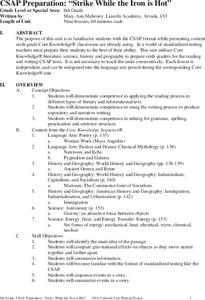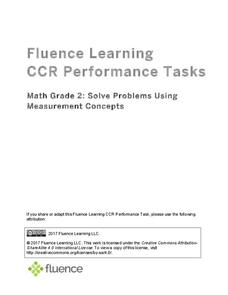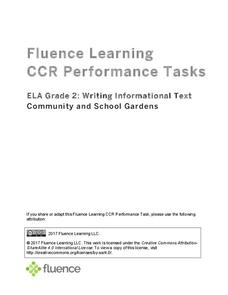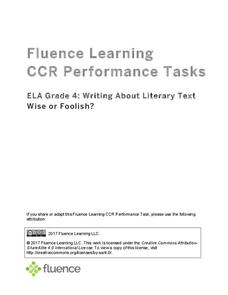Curated OER
Understanding the 1855 Census Database
Use data from the 1855 New York census to better understand the Irish immigrant experience during the late 19th century. Young historians analyze information from the census and build three hypotheses regarding the residents of the Five...
Institute of Electrical and Electronics Engineers
Waterproof that Roof!
Stop the raindrops from getting into the house! Eager engineers learn about roofing history and waterproofing by nanotechnology. They get into groups and work on designing a waterproof roof for a small model house. The accompanying...
Curated OER
CSAP Preparation: "Strike While the Iron is Hot"
Students survey several concepts in literature, science, history, and geography as a preparation for the CSAP standardized testing experience. This nine lesson unit provides exposure to the format and content of the test.
Student Handouts
Bubble Answer Sheet
Need a quick way to administer and grade a multiple choice quiz? Keep this bubble sheet as a staple of your curriculum toolkit! It can be used for assessments with up to 30 multiple choice or true/false questions.
Curated OER
Testing the Caverns
Students build model caverns using paper mache or clay and bury them in a tray of sand. They test the models by dropping balls onto them to simulate an asteroid hitting the earth. They evaluate the effectiveness of a structure against...
Curated OER
SAT Preparation
The verbal and quantitative sections of the SAT can be a challenge for even the most erudite logophile. Prepare your test takers for the vocabulary they will encounter on standardized exams by providing them with a helpful list of roots,...
Institute of Electrical and Electronics Engineers
Life Vest Challenge
After reading about the history and science of personal floatation devices, patents, and intellectual property, engineering teams design a life vest for a can of soup. To evaluate which groups considered the need for waterproofing, hold...
Curated OER
The Testing of the Feebleminded Immigrants
Students examine the intelligence testing of Henry Goddard during the early 1900s. They discover criticisms that are still occuring today. They analyze how science and technology is contributing to this practice.
PBS
Predicting/Making a Hypothesis
As an introduction to the hypothesis and testing method of investigation, young history detectives engage in a special investigation of a family artifact. After watching a short video that demonstrates the method, they develop a...
Virginia Department of Education
Analyzing and Interpreting Statistics
Use measures of variance to compare and analyze data sets. Pupils match histograms of data sets to their respective statistical measures. They then use calculated statistics to further analyze groups of data and use the results to make...
Curated OER
Rationalizing Race in US History
Students consider the classification of people. In this race studies lesson, students examine the concept of race as it relates to U.S. history and trends. Students research racial discrimination and prejudice in order to support their...
Curated OER
The First Americans
Third graders explore American history by researching Native Americans. In this American settlers lesson, 3rd graders research the Native American Woodland Indians and define the actions they took when faced with the European settlers....
United Learning
The Great Age of Exploration (1400-1550)
Delve into the Age of Exploration with this activity-packed resource! Complete with a pre-test, discussion questions and quiz for a 30-minute video on the period, map activities, timeline of discoveries, vocabulary, etc. this is a...
Curated OER
The History of Maple Syrup
Learners explore the process of harvesting maple syrup. In this science and history lesson plan, students make their own maple syrup and create a picture book that shows the Native American and American pioneer methods of making the syrup.
Curated OER
Testing Carving Tools
Students onstruct an ancient bow drill and compare its effectiveness at carving stone to marks made by other tools. They perform a careful analysis of the performance of each tool.
Fluence Learning
Writing an Argument: The NIEHS
Should the work of the National Institute of Environmental Health Sciences be funded by the government? Middle schoolers weigh in on the status of federal funding for programs that protect the environment with three text passages and...
Curated OER
Lippmann vs. The Testers: Can Intelligence Be Measured?
Pupils examine the ideas of Walter Lippman and standardized testing. They discover the ideas and beliefs behind using standarized tests. They examine a copy of an IQ test and discuss.
Curated OER
Testing Soils for Garden Planting
Sixth graders collect soil samples and record the location of the samples by using GPS.
Minnesota Literacy Council
Introduction to Historical Thinking
Christopher Columbus: hero or villain? Prepare class members for the debate with activities that asks them to think critically about how history is reported.
Fluence Learning
Solve Problems Using Measurement Concepts
Young mathematicians demonstrate what they know about measurement with a four-task assessment that focuses on estimation, length, and inches.
Fluence Learning
Writing About Literature: Comparing and Contrasting Characters in Heidi
Scholars read excerpts from the story, Heidi, in a three-part assessment that focuses on comparing and contrasting characters. Each part contains three tasks that challenge learners to discuss, answer comprehension questions,...
Fluence Learning
Writing Informational Text: Community and School Gardens
Two informational texts feature community gardens of the past and present and how seeds grow. Scholars read, discuss what they have read, complete a timeline, define words, and compose a brief essay about the texts' main idea.
Fluence Learning
Writing an Opinion: Is Pride Good or Bad?
Does pride really goeth before the fall, or can it be essential to one's development? Second graders read two of Aesop's fables that refer to pride in their morals, and write a short essay about whether pride is good or bad, based on...
Fluence Learning
Writing About Literary Text: Wise or Foolish?
A three-part assessment promotes reading comprehension skills. Class members read literary texts and take notes to discuss their findings, answer comprehension questions, write summaries, and complete charts.
























